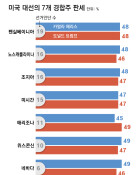Korea May Get Wartime Control Sooner
Korea and the U.S. are undergoing discord on the period Korean military will redeem the wartime operational control.
According to a source inside the military, at the 9th Security Policy Initiative (SPI) conference held in Seoul on July 13 and 14, the U.S. made a proposal of transferring operational control to Korea before the year 2010.
For the Korean Ministry of National Defense, which had set 2010-2012 as the target period for redeeming operational control, this is a rather unexpected offer.
Equipment must be prepared-
The first stage of the National Defense Reformation 2020 plan, which was announced last year, will be completed around 2010-2011. By that time, high tech equipment such as Airborne Early Warning and Control (AWAC) and reconnaissance satellites will be prepared. The plan is that by then, independent warfare ability will be satisfied, and redemption of operational control will be possible.
Based on this plan, President Roh Moo-hyun and foreign policy security authorities have declared that operational control will be redeemed in five years.
The Ministry of Defense is predicted to put out its opinion that redemption of control will fit around 2010-2012, when independent surveillance system on North Korea can be set up.
A contact inside the Ministry said, Both sides are negotiating over several proposals, and the specific period of redemption will be decided upon Korean military ability and the state of security, and announced at the Korea US Security Consultative Meeting (SCM) in October.
The reason the U.S. is suddenly hurrying the transfer of operational control, when it is well aware of the Korean military capability, is seen to be the result of increasing discord between Korea and the U.S. on pending issues.
When the Korean government delayed providing the U.S. Armed Forces air force in Korea with a shooting range after the closure of the Hwaseong city Maehyang shooting range, the U.S. has shown signs of dissatisfaction several times.
Since last year up until now, U.S. Defense Secretary Donald Rumsfeld, United States Armed Forces Commander in Korea Burwell Bell, and U.S. 8th Army commander David Valcourt have been asking for a quick settlement, saying that if conditions for training are not guaranteed, the air force will have to be moved out of Korea for training.
U.S. East Asia Pacific assistant secretary Richard Lawless also said at the 9th SPI conference, If U.S. air force pilots cannot train in Korea, they must train elsewhere. An alternate shooting range must be provided.
No training area for U.S. air force-
The Ministry of Defense is planning on installing automatic scoring equipment at the Jikdo Island shooting range overlooking the sea of Jeonbuk province, Gunsan city, so that it can be used by U.S. air force, but locals are stalling this plan.
Some analyze that Koreas refusal on the pollution elimination plan the U.S. proposed on the U.S. military base has had some influence.
While Korea declared the U.S. should return military bases after it has eliminated all pollutants according to user pay principle, the U.S. said it will eliminate only pollutants according to KISE (Known, Imminent, Substantial Endangerment to Human Health).
In the end, both sides have come to a mutual agreement that the U.S. should eliminate KISE and eight other pollutants, and the redemption of 15 out of 59 bases have been agreed upon at the 9th SPI conference.
However, immediately after the agreement, the U.S. expressed deep discontent on July 14, saying, It is unreasonable that Korea, which will receive facilities improved by millions of dollars U.S. citizens have paid in taxes, should require such strict environmental standards.
Sang-Ho Yun ysh1005@donga.com







